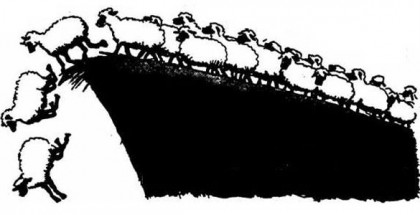Matt Cutts & Google’s Warnings About Link Building:
Forcing the Evolution of Website Promotion
When Matt Cutts, head of Google’s webspam team, makes a statement about an action Google has taken or will take in the future, SEO’s listen. His public statements regarding SEO tactics that Google does not want you to use often coincide with major changes to Google’s algorithm that have a serious impact on the way some SEO providers do things. Sometimes it forces them to change their entire business model. Back in March of 2012, Matt warned of a new penalty for sites that are overly optimized, which eventually became known as the Penguin update. In short, Penguin is an algorithm update which filters out sites that used low quality methods of link building to try to manipulate the search engine results. That update derailed the strategies of SEOs who had done little more than build links from thousands of blog comments, forum profile links, and links from directories nobody ever heard of or uses. Now, Matt is saying that guest blogging as a link building method is dead. True to form, the people who didn’t understand why the Penguin was developed, can’t understand why this is happening. The answer is in this quote from Matt’s recent blog post:
“Ultimately, this is why we can’t have nice things in the SEO space: a trend starts out as authentic. Then more and more people pile on until only the barest trace of legitimate behavior remains.” ~ Matt Cutts
 By now, there are many webmasters and SEOs who seem to have completely lost sight of the original intent of linking to other sites. They have also lost sight of the intent of most of the things they viewed only as “link building methods”. If you are not totally immersed in the world of search engine marketing, or are among the many part-time SEOs and webmasters who don’t get what Matt’s problem is, let’s take a look at some of the nice things that overzealous internet marketers have ruined…
By now, there are many webmasters and SEOs who seem to have completely lost sight of the original intent of linking to other sites. They have also lost sight of the intent of most of the things they viewed only as “link building methods”. If you are not totally immersed in the world of search engine marketing, or are among the many part-time SEOs and webmasters who don’t get what Matt’s problem is, let’s take a look at some of the nice things that overzealous internet marketers have ruined…
Links
In the early days of the internet, before Google, and before any algorithmic webcrawling search engines changed the way we found things on the web, “hypertext” links to other webpages were how it was all strung together. Links were the pathway to discovery, engagement and reaching a larger audience. That is what its all about in online marketing, right? Links were often placed in the footer, sidebar or on a page of links as a way to give some exposure to sites you thought were cool – as a form of networking. An endorsement. There was no Google or any other search engine using links as a way to measure the importance of a site. Links were placed on a website because the site’s owner or operator (nobody came up with titles like webmaster yet), for one reason or another decided that his or her readers should know about the site.
Along comes Google, and word gets out that they use links as a big part of how sites are ranked. People started exchanging links, not as a form of endorsing the quality or value of the other site, but as a way to try to improve their own rankings or that of the other site. Link schemes cropped up in all shapes and sizes – wheels, pyramids, triangles… And backlinks became a commodity. People started selling links from their own sites, or even creating sites just for the purpose of selling links. Just about anything you would search for resulted in Google giving you a list of pages that looked like they might be trying to give you the information you were looking for, but something was very wrong with whoever wrote the copy. So Google stopped counting those backlinks that were part of these obviously bogus attempts to fake the importance of a site.
Did this “kill” link building? No, of course not. People found other, somewhat better ways to get those oh so important links.
Directories
There were directories of websites. Yahoo, Best Of The Web, DMOZ, and others were nice ways for people to find new things on the web – and Google counted those links, sometimes placing more value on them than links from less well-known places. If having a few of these links is a good thing, then thousands of them is better, right? WRONG! It didn’t take long for thousands of directories to appear, many of which were not intended for human use – just there for the links. Google’s webspam team recognized this, and low quality directory links stopped passing much, if any, of their “link juice” value.
Why Link Directories “Died”: Abuse/Overuse
Comment Spam
As more blogs appeared on the web, links in blog comments became another way to get not just a few sensible links, but thousands of ridiculous links. “Nice post. Here’s a link to my crappy affiliate site…” became the norm. WordPress and other platforms eventually made these comment links “nofollow”, meaning they don’t pass PageRank, and Google pretty much ignored the rest.
Why Comment Spam “Died”: Abuse/Overuse. It is annoying.
Article Marketing & Content Farms
At some point, Google stated that sites that are regularly updated with quality content typically rank better. Google wanted to serve the freshest relevant results when possible. Content was declared king. This was interpreted by the “more is better” internet marketing crowd to mean “we must write blog posts every day about the keywords for which we must rank”. Since this type of internet marketer was typically looking for an easy way to game the system, they were not going to write all of that stuff themselves. All kinds of silly behavior ensued. Article marketing and content farms seemed like a good idea at the time, I guess. If you need a few hundred words about a topic for your site, but you are not an expert on it, someone else considers himself an expert and has already posted something you could use. Article marketing sites where a writer could publish a piece so that others could use it on their own site with a link back to the author’s site became the latest craze. This too, was overdone and those articles were recycled on hundreds or even thousands of other sites, resulting in a lot of duplicate content throughout the web, and most of it was crap. Article spinning – where an article is rewritten by software that swaps out certain words and rearranges parts of the text so it looks less like the original – is why you still find complete gibberish on throw-away blogs.
Why Article Marketing “Died”: Provided little to no value to users.
Social Bookmarks
Social Bookmarking sites like Digg, Delicous, StumbleUpon and others were developed as a way for “regular’ people without a website to share things they thought were cool. After a short time, thousands of social bookmarking sites appeared and quickly became another way to game Google’s link-based system. Most of these you have never heard of, and you wouldn’t find useful at all once they were filled with links to “Buy Ugg Boots” and other useless stuff. Most of the better social bookmarking websites have since no-followed the links.
Why Social Bookmarking “Died”: Abuse/Overuse. Little value.
Social Media
Facebook Likes/shares, Tweets and other social activity also became a commodity, and were also promptly ignored by Google. Even Google’s own Google+ has a questionable value in terms of link building. Social media’s real value is in the opportunity for engagement and exposure, but the herd stampeded toward the cliff of fake social activity as a link building method.
Why Social Media Link Building “Died”: Abuse/Overuse. Little value. Fraudulent.
YouTube & Other Video Sites
Videos tend to rank higher than other web entities, so the gold rush moved to YouTube and other video sites that filled up with useless videos, often stolen from their original creators and published with links in the descriptions. Now those don’t forward any link juice anymore.
Press Releases
Have some interesting company news? Before the internet, you would issue a press release and try to get it in front of the right people at whatever publications or broadcast media that might publicize your news. In my experience, well-written and timely press releases were more likely to be used by journalists than those that were not so well crafted. Online press release sites were created and caught on as a modern way to do this. As you might guess, the press release sites became as spam-filled as the article marketing sites were, with link-heavy frivolous releases about things nobody cares about – “Company X Publishes 100th Blog Post” or “Company X Signs Up for HootSuite” (nothing wrong with HootSuite, I just remember a particularly stupid press release of that nature). Matt and Google have fired a warning shot that almost put a stop to that, too.
Why Online Press Releases “Died”: Abuse/Overuse. Little value. Sometimes fraudulent.
Infographics
For a few years now, SEO’s and webmasters whose entire strategy was based on building as many of those easy & cheap backlinks as possible have been struggling with penalties, making lame excuses to clients (“Google changed the rules”), and generally pretending that they still know how to help a site become more visible in search results. Some SEOs did learn that they needed to have something better. So they all started using infographics. Lots and lots of infographics. After a short while, the web became flooded with these oversized images that supposedly carried useful information. The idea was that if I thought an infographic would be useful on my site, I could use it with condition that I include a link to the creator’s site. Those links, of course, were usually “spammy” in that they were carefully worded to use the exact keywords for which the original publisher wanted to rank. This, too, has been warned against by Google and/or Matt Cutts. I haven’t seen very many infographics lately.
Why Infographics “Died”: Abuse/Overuse. Little value.
Content
As mentioned above, content was declared king some time ago. But many internet marketers didn’t get that Google wanted unique, useful, informative or entertaining content – not just a sharp increase in word count. Duplicated content, “thin” useless filler, and generally poor quality were common, and Google reacted with the Panda algorithm update.
Guest Blogging
Article marketing & content farms eventually evolved into Guest Blogging. To link-crazed internet marketers, the idea was very similar to article marketing – write content for use elsewhere to get links, or get content from someone else in exchange for a link or two to wherever the author wanted you to link. Fair enough – you provide good content and a reward for that seems appropriate. Guest posts are also a great way to reach a wider audience. But that aspect didn’t seem to mean as much as the links. So here we are again – low quality content being published on sites that are full of it, and lots of undeserving websites climbing the search engine rankings as a result. Google is reacting accordingly. Serial guest bloggers are now crying bloody murder and asking “how are we supposed to build links then?” The short answer: You aren’t supposed to build links. You are supposed to earn links.
Google has repeatedly stated that if you have a website that is easily accessible to search engines and users, and provides quality content that is in some way unique, useful, entertaining, etc., then Google will recognize that through things like activity on the site, social activity related to it, and those oh so important links – when they occur editorially, not in exchange for money, goods, services, or any other compensation. This is true, but it does take some effort for an unknown site to get enough exposure for that type of linking to happen. So better SEOs realized that content needs to be promoted by a variety of means – contacting more visible people/sites who are trusted authorities on the topic, sharing with the right people on social media, and a variety of other creative ways to get the word out.
There are plenty of other things that have been pushed to the limits by misinformed webmasters, overzealous marketers, and “craphat” SEOs. The common theme is that when you stop using commons sense, and try to turn online marketing into strictly a numbers game with the belief that you will somehow “win” over all the processing power and clever minds at Google, you will lose. If you follow the rules, and work smarter at promoting your business through organic search, you can win big.
Next: What Can You Still Do To Get Links?
That’s funny, some of these “dead” tactics still work…



